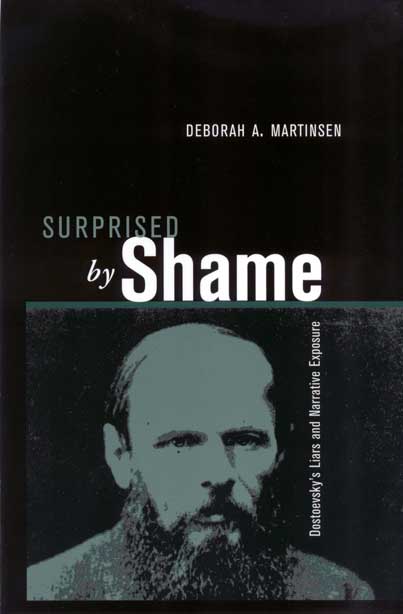click here to read excerpts from the book

Surprised by Shame
Dostoevsky’s Liars and Narrative Exposure
Deborah A. Martinsen
“This book has the rare distinction of addressing a complex of issues so prevalent in Dostoevsky’s work that one wonders why they have previously received little careful consideration. Indeed, Dostoevsky’s oeuvre manifests an obsession with shame, lying, and exposure, and Martinsen lays the groundwork for the understanding of this crucial thematic cluster. . . . Martinsen’s book raises a wealth of stimulating problems and offers many insightful interpretations.” —Slavic and East European Journal
 “This pathbreaking book brings together two separate areas of discourse—the
branch of psychology that focuses on shame and literary criticism. Deborah
Martinsen’s overall purpose is to demonstrate the profound understanding
Dostoevsky had of the implications of shame for his characters, for the
plots of his novel, for contemporary Russian culture, and, above all, for
his readers. The entire book literally brims with original readings and
exciting connections among things hitherto unconnected. Surprised by Shame
places Martinsen at the front rank of Dostoevsky scholarship.” —Robin Feuer
Miller, Brandeis University
“This pathbreaking book brings together two separate areas of discourse—the
branch of psychology that focuses on shame and literary criticism. Deborah
Martinsen’s overall purpose is to demonstrate the profound understanding
Dostoevsky had of the implications of shame for his characters, for the
plots of his novel, for contemporary Russian culture, and, above all, for
his readers. The entire book literally brims with original readings and
exciting connections among things hitherto unconnected. Surprised by Shame
places Martinsen at the front rank of Dostoevsky scholarship.” —Robin Feuer
Miller, Brandeis University
“Shame, Deborah Martinsen assures us, is back. How this psychological universal complicates the life of the spirit might well be Dostoevsky’s major contribution to the plot dynamics of the nineteenth-century novel. In her compelling study, Martinsen draws on ethical philosophy, anthropology, sociology, psychoanalysis, and her subject’s own staggering narrative gifts to pry out the secrets of this powerful emotion, at its most vulnerable and infectious in the mouth of the compulsive exhibitionist-liar. A wonderful and unsettling book, as Deostoevsky desired his own novels to be.” —Caryl Emerson, Princeton University
In Surprised by Shame, Deborah A. Martinsen combines shame studies and literary criticism. She begins with a discussion of shame dynamics, including the tendency of those who witness shame to feel shame themselves. Because Dostoevsky identified shame as a fundamental source of lying, Martinsen focuses on scenes when liars are exposed. She argues that by making readers witness such scandal scenes, Dostoevsky surprises them with shame, thereby collapsing the distance between readers and characters and viscerally involving them in his message of human interconnection.
Treating Dostoevsky’s liars as case studies, Surprised by Shame discusses varieties of shame and shamelessness; it also illustrates how Dostoevsky uses lying to indicate and expose subconscious processes. In addition, Martinsen demonstrates how Dostoevsky plucks shame from the realm of character trait and plot motive and embeds it in the narrative dynamics of The Idiot, Demons, and The Brothers Karamazov, thereby plunging readers into fictional experience and ethically transforming them.
By focusing on shame, this book uncovers new perspectives on Dostoevsky as writer and psychologist. By exposing how shame dynamics implicate readers in texts’ ethical actions, it enriches understanding of his tremendous influence on twentieth-century thinkers and writers. Finally, reading Dostoevsky as a prophet of shame-begotten violence reveals his universal relevance in a twenty-first century already scarred by acts of violence.
Deborah A. Martinsen is Associate Dean of the Core Curriculum and Adjunct
Associate Professor of Slavic at Columbia University.
|
Mar 2003 Russian literature, narrative scholars 320 pp. 6x9 |
|
| $125.95 cloth 978-0-8142-0921-9 | Add cloth to shopping cart |
| $39.95 Paperback 978-0-8142-5903-0 | |
| Theory and Interpretation of Narrative |


